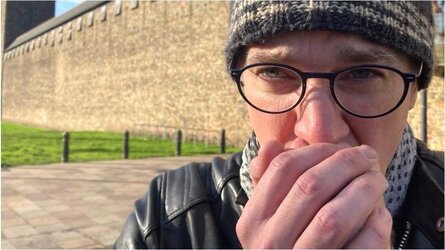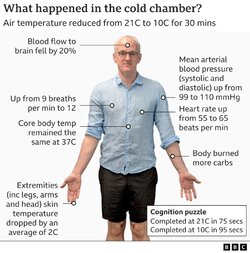
Staying warm: What does an unheated room do to your body?
The BBC's health and science correspondent undergoes an experiment to find out how a cold home affects him.
www.bbc.com

Staying warm: What does an unheated room do to your body? - BBC News
archived 19 Nov 2022 04:17:02 UTC

By James Gallagher
Inside Health presenter, BBC Radio 4
Mention deadly cold and I think of polar explorers with icicles dangling from their beards and mountaineers tackling the heights of Everest; of fingers turning black with frostbite and the chilling clutch of hypothermia.
So I was sceptical when I was asked to take part in a cold experiment that took place at just 10 degrees Celsius. Yes, 10C.
To me that's mild, nowhere near freezing and certainly no Arctic blast. Surely we'd have to go much colder before putting a strain on the body? I was wrong.
"It sounds mild, but it is a real physiological challenge," Prof Damian Bailey, from the University of South Wales, tells me.
He's invited me to his laboratory to explore the impact of cold homes on our bodies and why such seemingly mild temperatures can become deadly.
"Ten degrees is the average temperature that people will be living in, if they can't afford to heat their homes," said Prof Bailey.
And as I was about to find out, 10C has a profound impact on the heart, lungs and brain.
I'm led into the environmental chamber in the corner of the laboratory - it's all shiny metal walls and thick, heavy doors. In this air-tight room, scientists can precisely set the temperature, humidity and oxygen levels.
I'm hit with a blast of warm 21C air. The plan is to start at 21C, drop the temperature down to 10C and chart how my body responds to the chill.
First, I am wired up to countless state-of-the-art gizmos for the most in-depth analysis my body has ever faced.
My chest, arms and legs are dotted with monitors to track my body temperature, heart rate and blood pressure.
"You will look like something out of Star Wars," says Prof Bailey as another sensor and trailing cable is attached to my body.
A headset is fitted to monitor the blood flow in my brain just as the first beads of sweat breakout on my brow; an ultrasound inspects the carotid arteries in my neck (hearing the rhythmic whoosh of blood going to my brain is oddly reassuring) and I breathe into a huge tube that analyses the air I exhale.

The outfit was not a choice - the scientists needed direct access to the skin to conduct the experiment
The measurements are done. The scientists know how my body performs in a pleasant 21C. So the fans kick in and a cool breeze gradually lowers the temperature in the chamber.
"Your brain is tasting your blood as we speak and it's tasting the temperature and the brain is now sending signals to the rest of your body," Prof Bailey tells me.
The goal is to keep my core - that's my major organs including my heart and liver - at around 37C.
I was still unaware of the profound changes happening inside my body, but there were already clues on the outside.
By the time the room has dropped to 18C I was no longer sweating and the hairs on my arms were starting to stand up to help insulate my body.
"Science tells us that 18 degrees is the tipping point... the body is now working to defend that core temperature," Prof Bailey shouts over the droning fans.
Next my fingers turn white and they feel cold. The blood vessels in my hands are being closed off - known as vasoconstriction - in order to keep my warm blood for my critical organs.
This would happen even more quickly if I were a different gender.
"Women do tend to feel the cold more, because of hormones (oestrogen) their blood vessels in their hands and feet are more likely to constrict... and that makes us feel cold," says Dr Clare Eglin from the University of Portsmouth.
My first shiver kicks in at 11.5C as my muscles begin to shake to generate heat.
At 10C the fans shut down. I'm feeling uncomfortable, but not freezing as we repeated all the bodily measurements again at the lower temperature and it soon became clear I was wrong to doubt that 10C would affect me.
"The body is working jolly hard at 10 degrees," says Prof Bailey.

What shocks me is the change in blood flow to the brain and how much longer it takes me to complete a shape-sorting game.
I wouldn't want to be trying to do school homework in a cold room or to have this compound something like dementia.
"You're delivering less blood to the brain, so there's less oxygen and less glucose [sugar] getting into the brain and the downside of that is it's having a negative impact on your mental gymnastics," Prof Bailey says.
But my body is achieving its main goal of keeping my core body temperature stable - it's just having to do more work.
I'm pumping warm blood around my body more intensely with my heart beating faster and blood pressure also shooting up.
"That increasing blood pressure is a risk factor for a stroke, it's a risk factor for a heart attack," Prof Bailey tells me.
The blood itself is also changing "so it becomes a bit like treacle", says Prof Bailey, and this thicker gloopier blood also adds to the risk of a dangerous blockage.
It's why heart attacks and strokes are more common in the winter.

Prof Damian Bailey says "the evidence clearly suggests that cold is more deadly than the heat"
Fortunately, I started off with "fabulous vasculature", Prof Bailey tells me, but these internal changes are a risk to those who already have poor heart health and the elderly.
"The evidence clearly suggests that cold is more deadly than the heat, there are a higher number of deaths caused through cold snaps than there are through the heat snaps," says Prof Bailey.
"So I really do think that more recognition needs to be paid for the dangers associated with cold."
Cold favours viruses too
The cold also lends a helping hand to many infections that thrive in the winter months such as flu. Pneumonia, when there is inflammation in the lungs because of an infection, is more common after cold weather.It is easier for viruses to spread because we're more likely to meet up indoors with the windows shut and no fresh air to blow viruses away.
Cold also makes it easier for viruses to survive outside the body and cold air contains less virus-trapping moisture.
Dry air allows viruses to travel further distances, says Prof Akiko Iwasaki, an immunobiologist from Yale University. She has also performed experiments showing breathing in cold air affects how the immune system works in the nose.
Prof Iwasaki tells me: "At these cooler temperatures, your immune response becomes less active and this can allow virus to grow better within your nose."
What can you actually do about it?
In an ideal world we'd all heat the room we're in to at least 18C. When that is not possible, Prof Bailey says "it's like preparing for a mountaineering expedition".His tips are:
- focus on clothes that provide good insulation such as those made of wool
- gloves and warm socks are more important than a hat (but a woolly hat will help too)
- switch foods to a higher carbohydrate diet
- generate more body heat by moving around and not just sitting in a chair and watching TV.

As the weather gets colder, Matt Taylor and Colletta Smith share money-saving tips.
